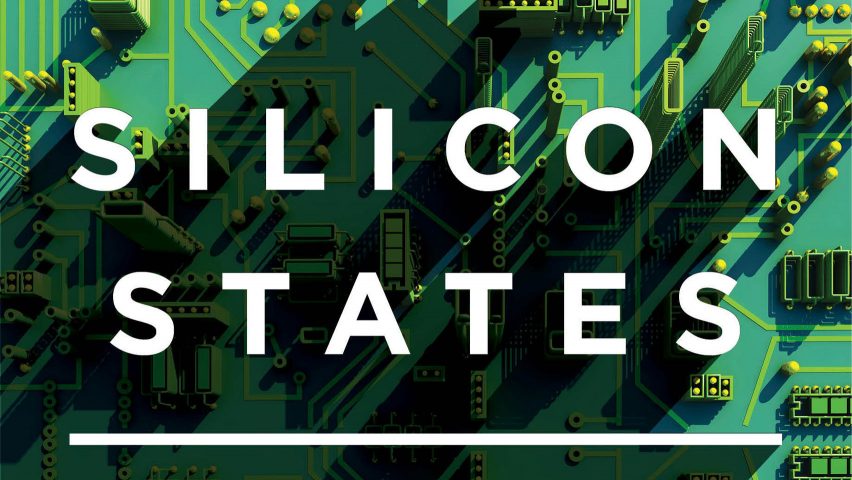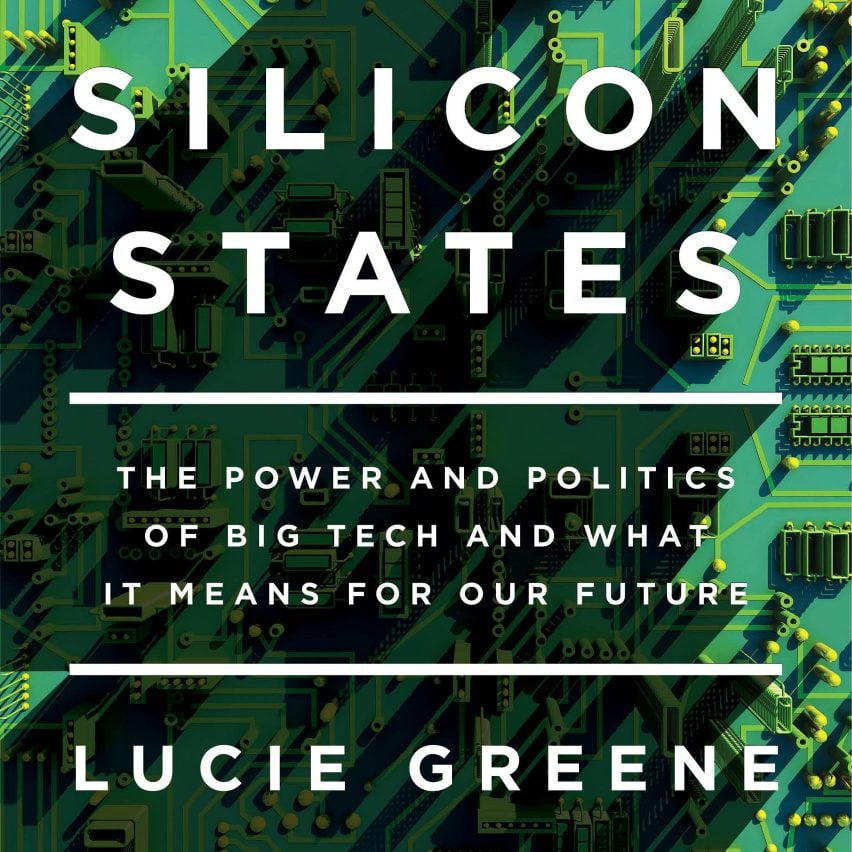
"Whole chunks of our environment are being privatised" says Silicon States author Lucie Greene
Silicon Valley companies including Alphabet, Amazon and Facebook are threatening democracy by usurping governments as the key provider of public spaces and services, according to a new book examining the rising power of tech giants.
In her book Silicon States, author Lucie Greene argues that these glamorous, fast-moving "big tech" firms are now competing against the "slow and unsexy" public sector to provide key services – and depriving authorities of vital tax revenues.
"They are looking at sectors regulated by the state and local authorities as their next areas to disrupt and fix, including health, town planning, education, transport, life sciences and space travel," Greene told Dezeen.
"They are doing this with altruistic rhetoric but more often than not there is a commercial interest."
Internet titans more powerful than governments
Silicon States argues that technology companies are becoming more powerful than governments and are increasingly shaping the world on their own terms.
"Big tech leaders and companies increasingly transcend the influence of government from a political, economic, cultural and ideological perspective," said Greene, who is global director of the The Innovation Group, a consumer insight unit at marketing and communications giant J Walter Thompson.
In addition, she says, "they are co-opting traditional power centres that live outside government, for example supplanting the media and starting to dominate philanthropy".
This trend will accelerate as these giant companies figure out ways to control and monetise the physical world, as well as the digital realm where they first became dominant, Greene believes.
Public space becomes an extension of the web
This will partly be achieved by harvesting and exploiting data captured in spaces that have until now been considered "public".
At the same time, advances in virtual reality and augmented reality will increasingly blur the distinction between the physical and the virtual, allowing online services to permeate every aspect of our lives.

"They are wrapping in data and sensors to make hyper-connected environments," Greene said. "Parks, towns and monuments could all be designed by these guys in future, not to mention the train stations and transit networks that we interact with."
As their online businesses mature, tech giants are finding that future growth depends on taking control of the real world. Activity is frenetic as they compete to stake out new markets, using their financial muscle, lobbying power and disregard for established protocols to shake things up.
Tech giants "memorialising themselves" through architecture
This coincides with a realisation among tech giants that, like industrialists and corporations before them, they can express their power through signature architecture.
Apple has recently completed its vast Norman Foster-designed campus; Facebook has commissioned Frank Gehry to design its headquarters; Google is building a campus designed by Thomas Heatherwick and Bjarke Ingels.
"They're also taking themselves more seriously, memorialising themselves in lavish headquarters, becoming patrons of the arts and designing towns," said Greene.
"They are increasingly becoming architects of civic life, transferring the aesthetic and approach they brought to their headquarters to urban design."
Transport and urbanism face tech disruption
Few sectors of state activity have escaped the tech giants' attention, but urban design and transport infrastructure are proving areas of particularly frenetic activity.
Facebook has made its first foray into town planning, developing its private Willow Village residential campus in Silicon Valley.
Amazon recently announced it will split its giant HQ2 campus between New York City and Arlington, following a controversial tendering process that saw cities across North America vying to offer it tax breaks and other incentives.
Alphabet has gone one further and set up Sidewalk Labs, a company that "imagines, designs, tests, and builds urban innovations to help cities meet their biggest challenges", and is now designing its first urban quarter in Toronto.
Underground travel and space flight are new frontiers
Tesla co-founder Elon Musk is developing Hyperloop long-distance transportation systems while his The Boring Company plans to dig a network underground transit tunnels, with the first opening in Los Angeles next month.
Apple, Google, Tesla, Uber and others are racing to dominate road transportation through their autonomous vehicle divisions, while air travel could similarly being disrupted as Uber and others develop passenger-carrying drones and flying cars, as well as the infrastructure required to manage them: Amazon and Google are both developing air-traffic-control systems for their drones.
Musk is also behind private rocket company SpaceX, while Amazon founder Jeff Bezos is working on a private space travel service.
Meanwhile Amazon is moving into education, postal infrastructure and personal finance and Alphabet subsidiary DeepMind is providing artificial intelligence services to the UK's National Health Service, amid concerns that it may break its promise not to share patient data with sister company Google.
State-run services often lack innovation
There are benefits to all this, Greene says, since they bring innovation to sectors that have often offered poor user experience.
"They are bringing a new visual language to sectors like health, finance and education, which is quite revolutionary in the sense that it's departing from the visual cues of the traditional institutional approach," she said.
"For the first time you're seeing healthcare positioned and branded like any other lifestyle brand, with an emphasis on simplicity and transparency. They are applying the same seamless user-experience design that has made Uber and TaskRabbit so successful."
When used responsibly, aggregated data can lead to better solutions, Greene said. Urban design could be improved by monitoring the movement patterns of people and cars, for example.
Data can help create better cities
"Data is being used to analyse and define the design of environments based on the way people move around them," she said. "So you're seeing data look at how crowds disperse, and crowd management can be affected by town planning design."
This is not the first time that private companies have taken control of public services, Greene points out, comparing the current era to the time of the 19th-century industrialists who laid railroads and built urban quarters, sometimes accompanied by public-minded philanthropic gestures such as the funding of libraries or cultural venues.
However data harvesting means that the social contract between private entities and the public domain is even more skewed in favour of today's corporations.
"The commercial interest is even bigger with this wave than previous industrialists because of the role of data and its value," Greene said.
Public space becomes private
"Every aspect of our existence is becoming commercialised thanks to sensors, the internet of things, visual and verbal recognition and so on. That data gets funnelled into hyper-personalised marketing and commerce. Whole chunks of our physical environment are being privatised."
Another concern is that while the ethos of government centres on the idea of serving the entire population, private entities are driven by profit. This means that the services they provide will tend to be directed at the 80 per cent of people who can afford them rather than the 20 per cent of people who need them.

"Airbnb is a good example," Greene said. "It is making travel affordable to middle classes and giving other stretched middle-class homeowners an important new revenue stream. It is also however distorting rents to the degree that in many cities, historic or lower-income renters can no longer afford to live there. It's a market-based solution."
Tax revenues diverted to private firms
In addition, profit-seeking services often displace public services, which are less efficient but which serve everyone. This means less tax revenue to pay for public services, creating a vicious circle.
"The implications are worrying," Greene said. "If 80-per-cent solutions replace government resources entirely or displace so much income from government services that they become ghettoised."
"For example, many millennials in New York now commute using Uber, Via and other affordable private transport networks, when they might previously have gotten the subway. That is displacing income from the subway, while removing a level of investment from the public transport network and placing pressure on its ability to create affordable transport for everyone, such as the bus boys who cannot afford an Uber."
Another example is postal services. If Amazon replaces state-run or state-regulated delivery networks, it may drop unprofitable routes to remote communities.
"Amazon is introducing new shipping networks but these will likely only be where it makes commercial sense," Greene said. "If you live on a remote Scottish island and depend on Royal Mail for package deliveries, you might find yourself high and dry if and when Amazon takes over, as this doesn’t make financial sense for them to provide."
The filter bubble gets physical
Furthermore, private services fracture society, since users who can afford them no longer have to share space with those who can't. This could mean that the notion of the online filter bubble, whereby algorithms ensure you only see information that confirms your existing biases, could extend to the physical realm.
"Private transport networks like this have a negative societal impact as it creates further distance by wealthy individuals from the societal fabric," Greene argued.
"They never have to ride the subway or wait for a train, which means they never have t engage with anyone outside their social class. It sounds silly but these public services provide a powerful soft civic service in making us engage in a collective community.
"The message is that Uber is making taxis affordable, but it's not affordable to all," she added.
Tech could create rising expectations, with middle-class citizens increasingly expecting public services to function "on demand" in the same way as dating, shopping and other services they order through their smartphones.
Apps isolate users from the world around them
These apps are "making us further isolated from a collective conscience and reinforcing our biases and selfishness," Greene said. "You only need to look at San Francisco where from Ubers to the white buses that ferry tech workers to offices, it allows them to ignore the reality of homelessness."
"They are draining empathy and our ability to deal with anything outside our comfort zone."
Finally, while technology could potentially reduce the cost to government of services such as healthcare by, for example, spotting disease earlier and encouraging healthier lifestyles, it could also deprive them of other vital funds. Driverless cars, for example, should never incur parking tickets or speeding fines.
The state is "slow and unsexy"
"I think there's a consensus that the state is slow and deeply unsexy," Greene concludes, suggesting that tech could undermine democracy itself.
"Young people are disengaged in democracy," she said. "And who could blame them when you look at the greying, largely male elites in political office.
"While there are rising concerns about Big Tech, there is still a belief that these tech guys are more efficient and able to solve world problems, and certainly more tech savvy than the government."
Silicon States: The Power and Politics of Big Tech and What It Means for our Future, is published by Counterpoint Press.